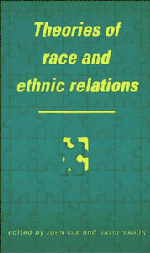Book contents
- Frontmatter
- Contents
- List of contributors
- Preface
- Introduction. Controversies and continuities in race and ethnic relations theory
- 1 Intersecting strands in the theorisation of race and ethnic relations
- 2 Epistemological assumptions in the study of racial differentiation
- 3 The role of class analysis in the study of race relations – a Weberian perspective
- 4 Varieties of Marxist conceptions of ‘race’, class and the state: a critical analysis
- 5 Class concepts, class struggle and racism
- 6 A political analysis of local struggles for racial equality
- 7 Ethnicity and Third World development: political and academic contexts
- 8 Social anthropological models of inter-ethnic relations
- 9 Pluralism, race and ethnicity in selected African countries
- 10 Ethnicity and the boundary process in context
- 11 Ethnicity and the sociobiology debate
- 12 Rational choice theory and the study of race and ethnic relations
- 13 The ‘Chicago School’ of American sociology, symbolic interactionism, and race relations theory
- 14 The operationalisation of identity theory in racial and ethnic relations
- Bibliography
- Index
8 - Social anthropological models of inter-ethnic relations
Published online by Cambridge University Press: 01 June 2011
- Frontmatter
- Contents
- List of contributors
- Preface
- Introduction. Controversies and continuities in race and ethnic relations theory
- 1 Intersecting strands in the theorisation of race and ethnic relations
- 2 Epistemological assumptions in the study of racial differentiation
- 3 The role of class analysis in the study of race relations – a Weberian perspective
- 4 Varieties of Marxist conceptions of ‘race’, class and the state: a critical analysis
- 5 Class concepts, class struggle and racism
- 6 A political analysis of local struggles for racial equality
- 7 Ethnicity and Third World development: political and academic contexts
- 8 Social anthropological models of inter-ethnic relations
- 9 Pluralism, race and ethnicity in selected African countries
- 10 Ethnicity and the boundary process in context
- 11 Ethnicity and the sociobiology debate
- 12 Rational choice theory and the study of race and ethnic relations
- 13 The ‘Chicago School’ of American sociology, symbolic interactionism, and race relations theory
- 14 The operationalisation of identity theory in racial and ethnic relations
- Bibliography
- Index
Summary
In a collection such as the present volume, one expects to find both detailed expositions of particular theoretical models or analytical frameworks – typically identified with individual authors or definite schools of thought – and more general surveys of a disciplinary field or area of academic discourse. In this context the papers by M. G. Smith and Sandra Wallman represent the first category of contribution; this paper falls into the second. As such, it is my intention to provide a broad discussion of currently influential social anthropological approaches to the study of ethnicity and racism, in order that those authors' exegeses of their own positions might be understood within their wider setting. This paper is not, however, intended merely to serve as a prolegomenon to Smith and Wallman. In the closing section I shall sketch in some of the alternative approaches which social anthropologists might – and, indeed, should – explore in their attempts to understand ethnicity and ‘race relations’.
Social anthropology and boundary maintenance
Before proceeding to the main body of the discussion, it is necessary to engage in some ground-clearing; in particular, it is important to define as precisely as possible, on the one hand, what is being included within the category of ‘social anthropological approaches’, and, on the other, what is being excluded and is not to be discussed in detail here. In other words, what are the boundaries of social anthropology and where do they lie?
- Type
- Chapter
- Information
- Theories of Race and Ethnic Relations , pp. 170 - 186Publisher: Cambridge University PressPrint publication year: 1986
- 34
- Cited by

